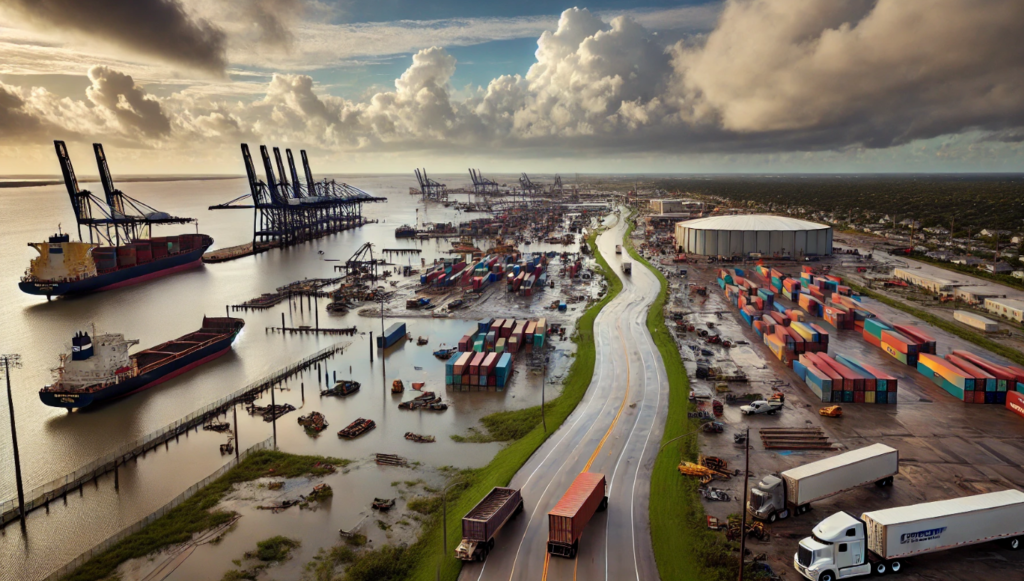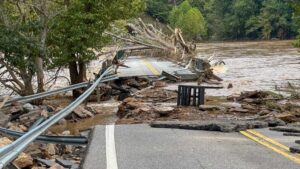Hurricane Milton Shakes Global Supply Chains
15th October 2024

Hurricane Milton has brought significant disruptions to Florida’s logistics networks, affecting everything from port operations to road and rail transportation. With logistics at the heart of global supply chains, the storm has created ripple effects that are likely to be felt across industries for weeks, if not months. Understanding the recovery process from Milton requires looking at the logistical systems in place, how they have responded to past disruptions, and what steps are necessary for a full recovery.
Port Closures and Supply Chain Disruptions
Florida’s ports are critical nodes in the global logistics network, particularly for imports of petroleum, construction materials, and consumer goods. Hurricane Milton forced the closure of key ports like Tampa Bay, Jacksonville, and Manatee, halting the flow of essential goods. This has led to immediate shortages, particularly in fuel, and delays in construction projects as materials like steel and cement are stuck offshore or rerouted through less efficient ports.
Port closures are especially disruptive to logistics because they act as choke points in supply chains. When one or several ports shut down, the entire flow of goods is interrupted. In this case, goods bound for the southeastern U.S. and even broader markets across the country are facing significant delays. The global shipping industry, already under strain from other disruptions, now faces rerouting challenges and extended lead times as ports in Georgia, South Carolina, and Alabama handle diverted shipments.
While smaller ports like Port Miami and Port Everglades are expected to resume normal operations within 1-2 weeks, larger ports like Tampa Bay may take 4-6 weeks to fully reopen for large cargo ships. This timeline is consistent with past recoveries, such as after Hurricane Irma, when it took weeks for normal port activity to resume.
Fuel Supply Chain Issues
Logistics within the fuel industry has been particularly affected by Hurricane Milton. With Florida ports closed to large tankers, the distribution of fuel to gas stations and other consumers has been delayed. This creates a bottleneck not only for the energy sector but also for road transportation, which depends on fuel for trucks to deliver goods across the region.
Restoring the fuel supply chain is critical for the broader logistics sector. Without fuel, trucking companies cannot meet delivery schedules, and supply chains for essential goods like food, medicine, and consumer products face even greater delays. Past hurricanes, such as Hurricane Michael and Hurricane Harvey, showed that fuel shortages can persist for weeks after the storm passes, especially when large ports remain closed.
Given that many gas stations are already running low on supplies, it is expected that fuel distribution will gradually improve over the next 2-3 weeks. However, full restoration of the fuel supply chain may take up to six weeks, as the largest tankers are only allowed to dock once safety inspections and infrastructure repairs are completed at major ports.
Transportation and Inland Logistics Challenges
The inland transportation network—comprising highways, railroads, and distribution hubs—is facing significant disruptions due to Hurricane Milton. Flooded roads and damaged rail lines have created delays in moving goods from ports to warehouses, factories, and retail locations. Trucking companies are reporting major delays, with some routes completely blocked due to flooding, which mirrors the disruptions seen after past storms like Hurricane Florence.

Logistics companies are responding by rerouting shipments to neighboring states or by using alternate transportation modes, but this comes with increased costs and longer delivery times. The rail network, crucial for moving bulk goods like steel, chemicals, and agricultural products, is also facing delays as assessments of track damage are carried out.
The recovery of Florida’s transportation network is expected to follow a staged approach. Road repairs and rail line assessments are already underway, but it could take 2-4 weeks for most major routes to reopen. Full restoration, particularly for more remote or heavily damaged areas, could take up to 6 weeks.
Global Supply Chain Disruptions
Florida’s ports are integral to global trade, particularly in connecting the U.S. with Latin America and parts of Asia. The closure of these ports due to Hurricane Milton has already created significant delays in the global supply chain. Companies that rely on just-in-time delivery of goods, such as retailers and manufacturers, are particularly vulnerable to these delays, which are expected to ripple through the global supply chain for up to three months.
International companies are rerouting shipments to other ports along the Gulf and East coasts, but this is straining those ports’ capacities and leading to higher costs for freight handling. The automotive, electronics, and consumer goods industries, which depend on the seamless flow of components and finished products, are likely to experience delays in both production and distribution. Similar supply chain disruptions were seen after Hurricane Katrina, when global supply chains took months to fully recover from the impact on Gulf Coast ports.

